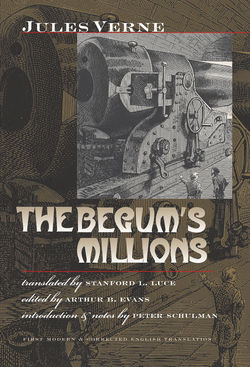Читать книгу The Begum's Millions - Jules Verne - Страница 8
На сайте Литреса книга снята с продажи.
ОглавлениеA NOTE ON THE TRANSLATION
This new translation of The Begum’s Millions by Stanford Luce is the first modern English translation of an important but often neglected Jules Verne novel, Les Cinq cents millions de la Bégum (1879). The two previous English translations both date from 1879. The first, an anonymous translation titled The 500 Millions of the Begum, was published by George Munro in New York; the second, The Begum’s Fortune, was published in London by Sampson Low from a translation by W. H. G. Kingston, who already had several Verne translations to his credit: The Mysterious Island (1875), Michael Strogoff (1876), and The Child of the Cavern (1877).
Although not surprising given the overall poor quality of nineteenth-century English translations of Verne’s works, neither of these two early translations of Begum was very faithful to Verne’s original text. For example, the names of many of the principal characters were altered: in one, the name of the Alsatian hero Marcel was changed to Max and, in the other (even more perplexingly), he was called Mureel; his young friend Octave was renamed Otto; the love interest Jeanne became Jeanette; and even Herr Schultze himself lost the final “e” of his name — necessitating a translator rewrite of a crucial passage in the denouement of the story in chapter 18.
One also finds in these English translations a large number of errors and abridgments, many of which severely compromise the integrity of Verne’s narrative. For instance, in the following passage, note how the translator has altered both the style and the meaning of Verne’s characterization of Dr. Sarrasin when the good doctor is first given the news of his huge inheritance:
Dr. Sarrasin was thunderstruck. For a moment, he remained entirely speechless. Then, feeling a bit guilty about his temporary lapse of critical reasoning and being unable to accept as proven fact this dream straight out of the Thousand and One Nights, he replied: “But after all, sir, what proofs can you give me about this story, and what led you to find me here?” (Luce trans. of Verne original)
Dr. Sarrasin sat petrified — for some minutes he could not utter a word; then, impressed by a conviction that this fine story was without any foundation in fact, he quietly said: “After all, sir, where are the proofs of this, and in what way have you been led to find me out?” (Kingston trans., Sampson Low, p. 8)
Even worse, consider the following mistranslation where the literal-minded translator bungled Verne’s metaphor of Paris as a competitive social arena (la grande lutte parisienne) by sending the hero to a wrestling match instead:
Marcel Bruckmann was one of those outstanding young champions, both spirited and discerning, that Alsace sends forth every year to fight in the great battlefield of Paris. (Luce trans. of Verne original)
Mureel Bruckmann was one of those valiant champions which Alsace is in the habit of sending every year to Paris, to contend in wrestling. (trans. anon., Munro ed., p. 3)
Defying the simplest logic, these translations often twist the story’s meaning to say the opposite of what Verne wrote. The following description of Herr Schultze scornfully dismissing the utopian project of his French rival is quite typical:
This enterprise seemed absurd to him and, to his way of thinking, was destined to fail since it stood in opposition to the law of progress which decreed the collapse of the Latin race, its subservience to the Saxon race, and, as a consequence, its total disappearance from the surface of the globe. (Luce trans. of Verne’s original)
This enterprise appeared to him to be absurd and in his opinion should not be allowed to go into effect, as it was opposed to the laws of progress: it decreed the overthrow of the Saxon race and, in the end, the total disappearance of it from the face of the globe. (anon. trans., Munro ed., p. 7)
For well over 100 years, English-language readers of Jules Verne have had to struggle with inaccurate, incompetent, or ideologically skewed translations of his Voyages extraordinaires, most dating from the nineteenth century. There is no doubt that Verne’s literary reputation suffered as a consequence. The year 2005 marks the centenary of Jules Verne’s death, and it seems an especially appropriate time to celebrate Verne’s legacy by publishing a faithful version of his first cautionary novel, The Begum’s Millions.
